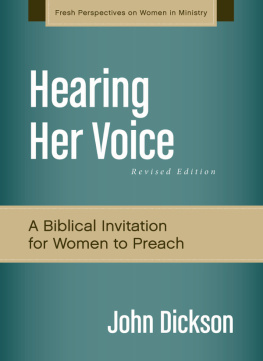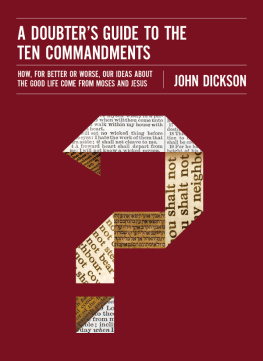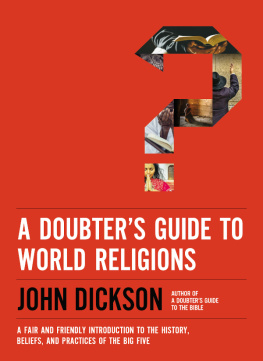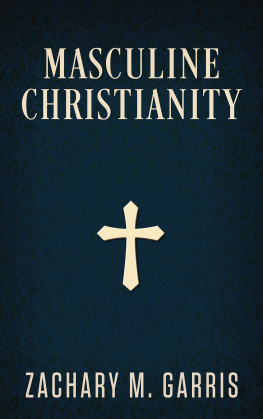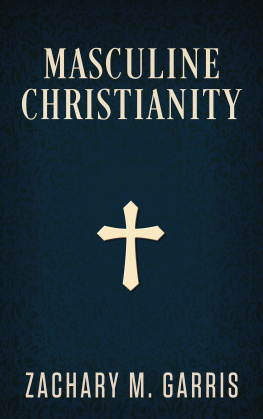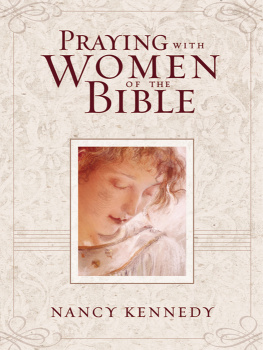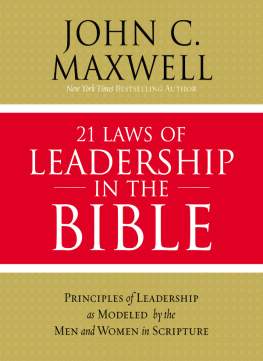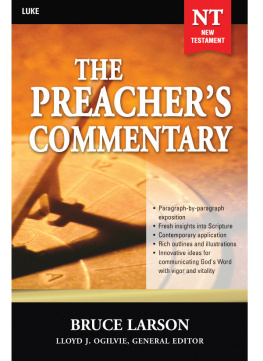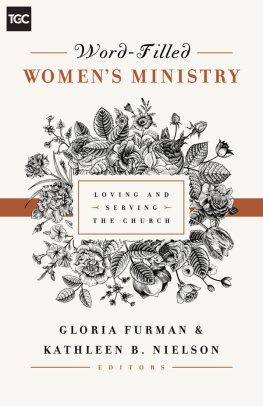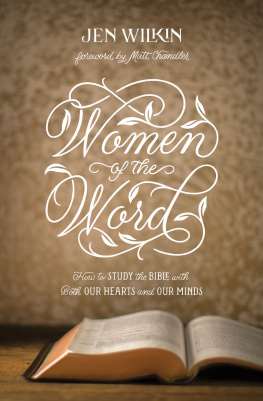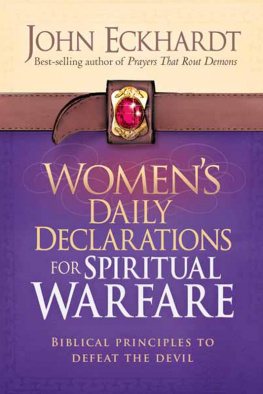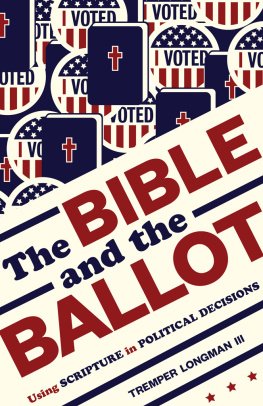
This provocative book challenges an understanding of Paul on womens ministry that many have long thought to be beyond question. But historical cross-examination confirms Dicksons case in a way that makes appropriate a rethinking of practice.
J. I. PACKER, Board of Governors Professor of Theology, Regent College
Can anything new possibly be said in the endless debates over gender roles in the church? If something new is said, could it possibly be true? The answers to both questions are yes! John Dickson has recognized the limited, technical sense of teaching in many ancient religious contexts, including Christian ones, especially Paul, and consistently in the Pastoral Epistles. Applying this recognition to 1 Timothy 2:12, he has convincingly demonstrated that even a conservative complementarian has no exegetically based grounds for preventing women from delivering sermons. He wisely bypasses entirely larger questions of ordination and leadership for this one virtually incontrovertible observation. That many complementarians continue to controvert it demonstrates the extent to which, however unwittingly, they are bound to the traditions of men rather than to the Word of God!
CRAIG L. BLOMBERG , Distinguished Professor of New Testament, Denver Seminary
Paul, of course, has women praying and prophesying in the meeting. So, why not also teaching? Must one downplay or discard this ban? In this book, however, we learn that we have been missing the special force of that word anyway. With John Dickson, a careful researcher into the context and setting of the New Testament, we uncover its history. This is no mere battle over words. Apart from instinct and the bare data, all meaningful knowledge (i.e., science) is revealed through enquiry (i.e., history). The testimony of this gifted expositor convincingly discloses the lost meaning of Pauls teaching.
EDWIN JUDGE , Emeritus Professor of History, Macquarie University
A compelling argument grounded in careful exegesis and evidencing a robust view of biblical authority. Those who already agree with Dicksons conclusions and those who dont have much to learn here. I know I did.
GRAHAM COLE , Anglican Professor of Divinity, Beeson Divinity School, Samford University
Some of us say we give supreme authority to the Bible, and yet we can be pretty confused (at best) or careless (at worst) in how we use biblical words. Was there any difference in the NT between preaching, teaching, exhorting, prophesying, evangelizing, etc? I confess I had never given the matter much thought, being content to know they were all among the rich gifts of Gods Spirit for the blessing of his whole church. But John Dicksons detailed survey and careful distinctions should make us all think again. Whatever our view on what kinds of ministry women should or should not exercise, and whether or not we are convinced by the authors conclusions (as I am), this book forces us to bring our thinking and our practice to Scripture and test them there.
DR. CHRIS WRIGHT , International Ministries Director, Langham Partnership
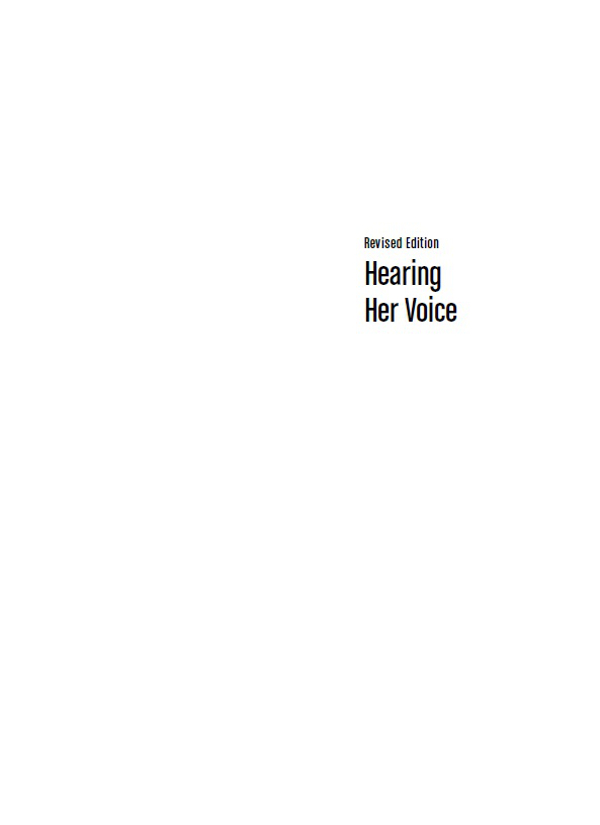
The author has waived all royalties and income from this book.
ZONDERVAN
Hearing Her Voice, Revised Edition
Copyright 2012, 2014 by John Dickson
Requests for information should be addressed to:
Zondervan, 3900 Sparks Drive SE, Grand Rapids, Michigan 49546
ePub Edition June 2014: ISBN 978-0-310-49266-5
All Scripture quotations, unless otherwise indicated, are taken from The Holy Bible, English Standard Version, copyright 2001 by Crossway Bibles, a division of Good News Publishers. Used by permission. All rights reserved.
Any Internet addresses (websites, blogs, etc.) and telephone numbers in this book are offered as a resource. They are not intended in any way to be or imply an endorsement by Zondervan, nor does Zondervan vouch for the content of these sites and numbers for the life of this book.
All rights reserved. No part of this publication may be reproduced, stored in a retrieval system, or transmitted in any form or by any meanselectronic, mechanical, photocopy, recording, or any otherexcept for brief quotations in printed reviews, without the prior permission of the publisher.
Cover design: Ron Huizinga
Interior design and composition: Greg Johnson, Textbook Perfect
14 15 16 17 18 19 20 /DCI/ 20 19 18 17 16 15 14 13 12 11 10 9 8 7 6 5 4 3 2
For Sophie and Josephine
Contents
Abbreviations
| ICC | International Critical Commentary |
| JETS | Journal of the Evangelical Theological Society |
| JSNT | Journal for the Study of the New Testament |
| JTS | Journal of Theological Studies |
| NIGTC | New International Greek Testament Commentary |
| NIBC | New International Biblical Commentary |
| TSAJ | Texte und Studien zum antiken Judentum |
| WBC | Word Biblical Commentary |
| WUNT | Wissenschaftliche Untersuchungen zum Neuen Testament |
Introduction
A Very Modest Argument
Let a woman learn quietly with all submissiveness. I do not permit a woman to teach or to exercise authority over a man; rather, she is to remain quiet. (1 Timothy 2:1112)
T he question of women delivering sermons in church is a touchy one for many evangelical Christians. For some it is even a test case of whether someone is an evangelical. I remember the dismay of one of my pastor friends when he was told by his ecclesiastical superior, It is sinful for a woman to preach, and sinful for a man to let her. Such language powerfully raises the stakes. We want to get this issue right.
Strong feelings about women delivering sermons arise mainly because the Bible is interpreted to forbid a woman to preach (1 Tim. 2:12). In part, it is also because inviting women into the pulpit is seen as a first step on a slippery slope to women holding the full range of offices in the church. This short book has nothing to say about ecclesiastical offices. Rather, it is about whether it is biblical to invite women to give the twenty- to thirty-minute message in the church service. Having long believed otherwise, I now think the answer is yes.
My argument is straightforward (even if it takes a while to provide a full account and to answer potential objections). Put simply, there are numerous public-speaking ministries mentioned in the New Testamentteaching, exhorting, evangelising, prophesying, reading, and so onand Paul restricts just oneof them to qualified males: teaching. Given that he repeatedly describes these various functions as different, it is essential to know what the apostle means by teaching and whether the modern sermon is its true counterpart. If todays sermons more closely resemble what Paul called exhortation, for instance, that would surely change the relevance of 1 Timothy 2:12 for the discussion, since that passage has nothing to say about exhortation.
The word sermon is not a biblical term. It comes from the Latin sermo, or discourse, talk. But sermon and teaching have become virtually synonymous. When a church today is described as having good teaching, most evangelicals presume the reference is to good sermons. Thus the thrust of Pauls injunction, I do not permit a woman to teach, seems clear: women must not deliver sermons. This is what we might call the plain sense reading. Rarely do we consider whether this reading assumes
Next page
